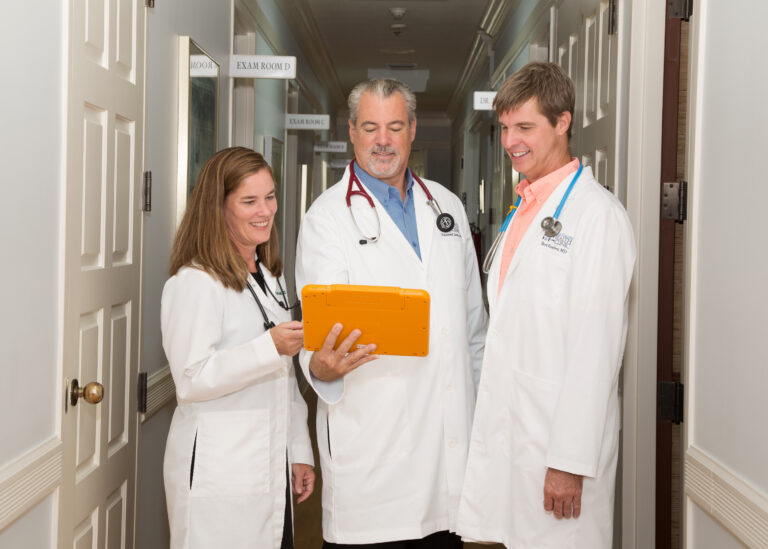
Colon screening saves lives

March is National Colorectal Cancer Awareness Month, and the American Cancer Society (ACS) has some sobering news for us. According to its report issued March 1, 1 in 5 colon cancer diagnoses now occurs in people younger than 55 years old. The report also notes a trend toward more advanced disease in people of all ages. In 2023, the ACS estimates that of the 153,020 people diagnosed with colorectal cancer in the U.S., 52,550 will die from the disease. That’s 3 in 5 people.
The very best way to reduce your risk of colorectal cancer is to follow screening guidelines and get a stool-based test or a visual exam (a colonoscopy) when it’s recommended. Any suspicious polyps can be removed during a colonoscopy, thus preventing or reducing your risk of cancer.
Who should get screened?
The U.S. Preventive Services Task Force recommends that screening for men and women start at age 45 – not 50. The Task Force continues to strongly recommend screening people who are 50 to 75 years old. Adults ages 76 to 85 should talk to their doctor about screening.
What screening should I get?
Several screening tests are available to find polyps or colorectal cancer. Talking with your doctor about your family history and your medical condition will help you decide which option is best for you.
- At-home Stool Tests – stool samples are collected at home and sent away to a lab for analysis. The Cologuard test detects the DNA and blood released from altered cells and can detect both precancer and cancer. A Fecal Immunochemical Test (FIT) is recommended annually, and Cologuard every three years if testing is negative. A positive Cologuard test results require a follow-up with colonoscopy.
- Flexible Sigmoidoscopy – a procedure where a short, thin, flexible, lighted tube is inserted into your rectum to check for polyps or cancer inside the rectum and lower third of the colon. This procedure can be done with or without sedation. This should be done every 5 years, or every 10 years with a FIT test every year.
- Colonoscopy – a longer, thin, flexible, lighted tube is used to check for polyps or cancer inside the rectum and the entire colon. During the test, the doctor can find and remove most polyps and some cancers. Colonoscopies are also used to follow up on anything unusual found during one of the other screening tests. This procedure is done under a level of sedation or anesthesia that prevents you from feeling anything. This should be done every 10 years (for people who do not have an increased risk of colorectal cancer).
- Virtual Colonoscopy – a less invasive procedure, this is a special X-ray examination of the colon using low dose computed tomography (CT). A radiologist reviews the images from the virtual colonoscopy to look for polyps on the inside of the colon that can sometimes turn into colon cancer. This should be done every 5 years.
At-home Stool Tests – stool samples are collected at home and sent away to a lab for analysis. The Cologuard test detects the DNA and blood released from altered cells and can detect both precancer and cancer. A Fecal Immunochemical Test (FIT) is recommended annually, and Cologuard every three years if testing is negative. A positive Cologuard test results require a follow-up with colonoscopy.
Flexible Sigmoidoscopy – a procedure where a short, thin, flexible, lighted tube is inserted into your rectum to check for polyps or cancer inside the rectum and lower third of the colon. This procedure can be done with or without sedation. This should be done every 5 years, or every 10 years with a FIT test every year.
Colonoscopy – a longer, thin, flexible, lighted tube is used to check for polyps or cancer inside the rectum and the entire colon. During the test, the doctor can find and remove most polyps and some cancers. Colonoscopies are also used to follow up on anything unusual found during one of the other screening tests. This procedure is done under a level of sedation or anesthesia that prevents you from feeling anything. This should be done every 10 years (for people who do not have an increased risk of colorectal cancer).
Virtual Colonoscopy – a less invasive procedure, this is a special X-ray examination of the colon using low dose computed tomography (CT). A radiologist reviews the images from the virtual colonoscopy to look for polyps on the inside of the colon that can sometimes turn into colon cancer. This should be done every 5 years.
Ways to reduce your risk of colorectal cancer
Screening tests can prevent cancer or diagnose it early, when it’s most treatable. There are other ways to help reduce your risk. The ACS recommends the following:
- Eat lots of vegetables, fruits, and whole grains
- Get regular exercise
- Take control of your weight
- Don’t smoke
- Avoid alcohol
More Recent Healthcare News

Every year we celebrate Doctor’s Day and Nurses Week, but there’s one more recognition event that’s just as important. Administrative Professionals Day is April 24th this year and I want to be sure to bring special attention to three incredibly special members of the Boca Grande Health Clinic family. Jonna Foos, Director of Operations Jonna […]

April, the birth month of James Parkinson, is Parkinson’s Disease Awareness Month. Parkinson’s is a degenerative syndrome that results in the gradual loss of brain circuitry involved in movement, thinking and behavior. According to the National Institutes of Health (NIH), the first clear medical description of Parkinson’s Disease as a neurological condition was written in […]

March 30th marks a special day on our calendar – Doctor’s Day! It’s a time to honor those who dedicate their lives to caring for us. At the Boca Grande Health Clinic, it’s the extraordinary team of board-certified physicians – Dr. Raymond A. James, our Medical Director; Dr. Bret Kueber, the Assistant Medical Director; and […]

Ask a Doc: Kicking Colon Cancer in the Butt
March 22, 2024According to the American Cancer Society, the lifetime risk of developing colorectal cancer is about 1 in 23 for men and 1 in 25 for women. The death rate from colorectal cancer has been dropping in older adults for several decades. Unfortunately, colorectal cancers now rank as the leading cause of cancer death in men […]

